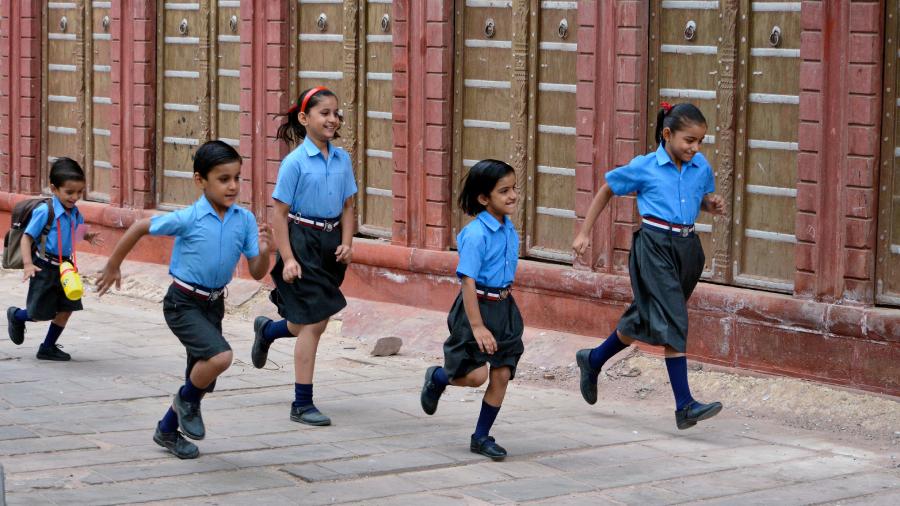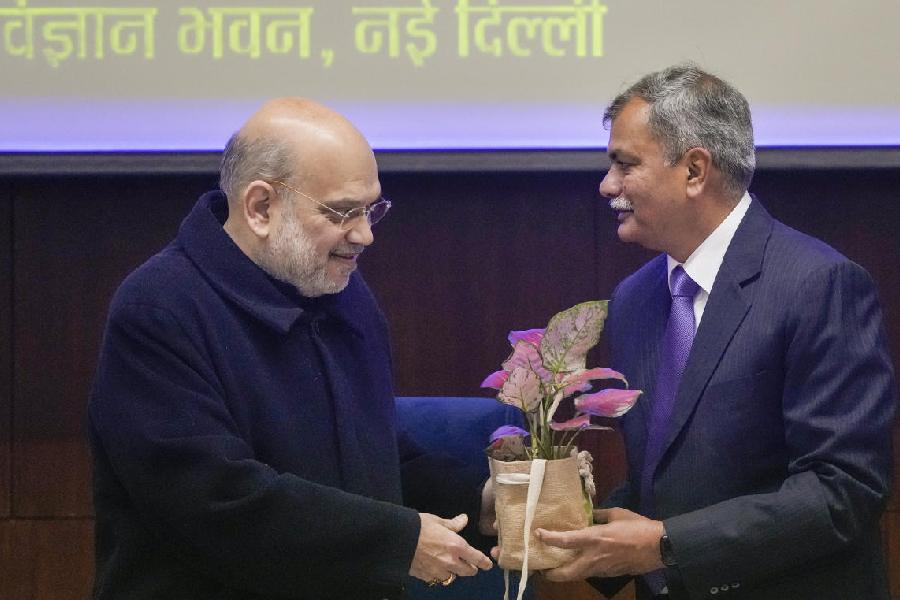Mou Maiti, 8, Ariadaha
For someone who has barely been outside Ariadaha in the northern fringes of Greater Calcutta, forget West Bengal, eight-year-old Mou Maiti speaks fluent Hindi. According to her mother Mamoni, who works as a househelp, she possibly also thinks in Hindi. She has heard her daughter muttering “Nahin, aise to nahin hoga. Phir kaise? Achchha koshish karte hain,” while figuring out how to draw something, put together a puzzle or attempt her homework. Her wee scholarship is a lockdown acquisition.
The pandemic meant no school, which meant Mou had to stay home all the time, which in turn meant a lot of TV viewing, possibly a lot of Hindi serials.
Mou was enrolled in Ariadaha Sarbamangala Balika Vidyalaya, a girls’ school, after the pandemic struck. So this Class I student, like many others, had never seen the inside of a school building until a week ago. Instead, it was her mother who went to that place called school to collect mid-day meal rations — sugar, rice, dal, dried gram and soya nuggets. And the only teacher Mou has known all this while is the one who tutors her morning and evening and for whose services her mother pays through her nose.
Mou barely knows any of her classmates. But now that school has reopened, this is what she is looking forward to the most. Says the little girl with a moon face luminous with expectation — “I’ll have a lot of friends.”
Priyanka Chitrakaar, 5, Pingla
The pandemic put Priyanka Chitrakaar’s childhood on wheels. The five-year-old would have joined school this year if it wasn’t for the pandemic — holding online classes is quite impossible in her little village of Pingla in West Midnapore. And since she doesn’t have school, she is free to accompany her parents wherever they go.
Priyanka’s parents, Sonia and Mustafa, are patachitrakars — descendants of bards who sang mythical and religious tales and also illustrated them on rolls of cloth. These days they go from fair to fair selling their artwork and wares. And as Priyanka has no school to anchor her at home, she has been travelling along — to Burdwan, to Berhampore, as well as multiple trips to Calcutta.
Priyanka has a tutor she regularly visits when at home and from whom she has learnt her numbers and letters, both Bengali and English. When she travels, she practises her spoken English via an app on her mother’s smartphone and YouTube. Her mother, who is the only one in her village to have mastered that foreign tongue, is keen that Priyanka learn it too.
“Then, like Ma, I too can go to Delhi, Bombay, Bangalore, Germany and Paris,” she says. Her pandemic experience has given her the travel bug. Ironic, that.
Rahul Lohar, 10, Lataguri
The virus stole Rahul Lohar’s football. The one thing this Class IV student from Lataguri in Jalpaiguri district has been looking forward to has been his football sessions with friends every afternoon. During that time nothing else mattered — not his missing father, not his barely-filled belly, nor that he had never owned a ball in his life.
Then came the coronavirus. The club shut its doors and though Rahul and his friends had more time on their hands, they could not play as they lost access to the football.
In the meantime, the stoic little man joined his tea-plucker mother at work. Tea gardens are happy to employ children as they don’t have to pay them too much. With schools closed, the ranks of those picking the autumn flush swelled with children.
Neelam Oran, 8, Mal
From all that the pandemic deprived her of, what Neelam Oran misses the most is her ride to school. The eight-year-old is one of the few children in the Neoranadi Tea Estate Coolie Bustee who attended a Hindi-medium school, one that is 20 kilometres away. The tea estate authorities of Mal in Jalpaiguri district provided a small bus and Neelam loved the journey.
It is not that she never travelled by bus otherwise but these journeys were special. First, she always got a window seat. Second, the route was scenic, through fields, over a river, around a bit of jungle.
Everything looks different from a bus, she says, it all looks better, the dark green tea garden with wisps of mist, the sunshine silvering the river, even the potato fields.
In 20 years’ time, should she look back on this patch of her life, there is a chance she might only remember potato fields. She is worried that she has already forgotten her two years’ worth of school education.
Since the lockdown, Neelam goes to work every day in the potato fields near Lataguri after a machine has turned the earth and exposed the underground tubers to the sun. Her job is to pick the potatoes. On any given day she and her friends manage to collect 10-15 sacks of these tubers. Each sack accommodates 50 kilos.
Ironically, Neelam and her mother cannot afford to buy the very vegetable she spends all her day with, or any other vegetable for that matter. Pandemic or no pandemic, that hasn’t changed.











